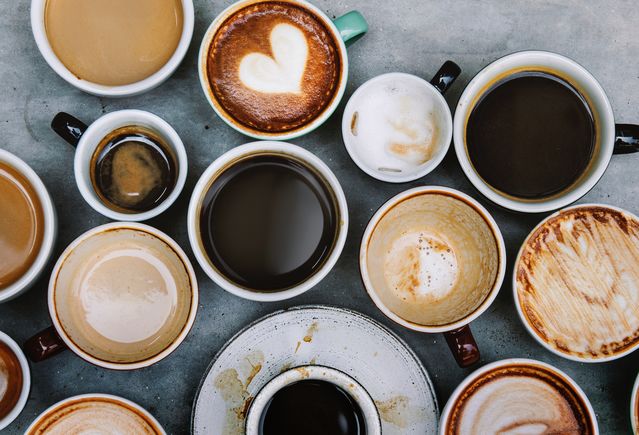Environment
Too Much Choice
Too many choices can leave you dissatisfied and disappointed.
Posted October 9, 2018 Reviewed by Abigail Fagan

Much of today’s Western culture is based on the liberal belief in the freedom of choice. By making our own decisions, in line with our individual preferences, we expect to increase well-being and happiness. This is supported by the economic market, which has adapted to offer a maximum of product variety to cater to every possible consumer preference. Awesome, right?
Consider, for example, any typical coffee shop. In a quest to offer a uniquely satisfying and bespoke experience, you have a choice between a variety of different beans (Arabica or Robusta), countries of origin (Colombia, Brazil or Ghana) and roasts (blonde, medium or dark).
But picking a bean is only the first step. Next, you have to decide on a specific coffee drink. Ristretto? Espresso? Lungo? Café crema? Macchiato? Cappuccino? Flat white? Café au lait? Turkish coffee? Americano? Long black? Mocha? Caffe latte? Frappé? Irish coffee? Then comes the milk. Full-fat? Semi-skimmed? Skimmed? Lactose-free? Soy? Almond? Oat? Rice milk?
Indeed, Starbucks proudly advertises a choice of 80,000 different drinks combinations. But is this really a reason to celebrate? As a yogi with a passion for green tea, the sheer variety of coffee drinks baffles me. Sure enough, tea also comes in lots of flavours (my current favourite is Twinings Matcha Green Tea with Cranberry and Lime). However, at the end of the day, all tea is prepared the same way. Pour hot water over it and enjoy.
Decision Paralysis
With 80,000 different drinks options, how do you ever find your favourite drink? If you took a diligent approach and tested every single coffee drink, you’d end up spending 109 years trying two different Starbucks drinks every day. Clearly, you’d be dead before finishing the experiment.
Choosing between numerous options can be daunting—so much so that consumers shy away from the process altogether. To avoid the difficult choice, they might settle for water instead. It's not quite what they wanted, but the decision was so much simpler!
Disappointment
Research shows that if you’re surrounded by an abundance of options, you typically end up less satisfied with your final decision than if you’d been given fewer options in the first place. Sound absurd? Well, let’s test this with a little thought experiment. Imagine that after 10 minutes of studying the Starbucks drinks menu, you end up ordering an Iced Blonde Cold Foam Cappuccino with skimmed milk and one sugar. You like your choice and happily slurp your Cappuccino in the sun.
Suddenly, some unwanted thoughts pop into your mind. How do you know there wasn’t a better option? With 80,000 alternatives, surely you can always do better? And don’t you remember yesterday’s drink—that Vanilla Bean Coconut Milk Latte? You weren’t too keen on the coconut milk, but that vanilla flavour was just gorgeous. Now that you think of it, don’t you miss that hint of vanilla? And after all the time you spent studying the drinks board, shouldn’t the outcome be more satisfying?
Self-Blame
Finally, too much choice can lead to unwarranted self-blame. In Starbucks, a coffee lover’s paradise, being dissatisfied with your drink can only mean one thing: You made the wrong choice. With all of the amazing options at your disposal, you somehow managed to mess up the order and are now left sipping what tastes like dishwater. Nobody else to blame but you.
Choice overload can leave you frustrated with the decision process, dissatisfied with the outcome, and disappointed with yourself. But let me make one thing clear: I am not suggesting to abolish all choice. Let’s face it, a coffee snob will never be happy with a chamomile infusion. No, rather than getting rid of all choice, we need to find a healthy compromise.
Beauty in Simplicity
In a fast-paced world packed with different options, decision making becomes a complex task. One way of navigating the complexity is through yoga, by finding focus in simple, purposeful poses. No need to twist yourself into fancy pretzel shapes to reap the benefits of the practice. A wonderful and seemingly simple exercise is tree pose (Vrksasana).
The pose (for instructions, see this helpful website) is in fact surprisingly challenging, and many yogis find themselves wobbling all over the mat while attempting to stand up straight. Tree pose forces us to keep our mental focus in order to maintain balance. By rooting down through the standing leg, the pose also helps us feel grounded in a busy world. For an extra challenge, why don’t you try closing your eyes during the practice?
Further Information
If you enjoyed this topic, I’d recommend checking out Barry Schwartz’s excellent TED talk on the paradox of choice. I admire Barry’s wit and reminiscent love of old jeans. Nevertheless, I doubt that his idea for a mobile phone with in-built nose hair trimmer and crème brûlée torch will ever take off. He better come up with a few more options!




